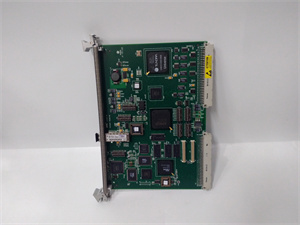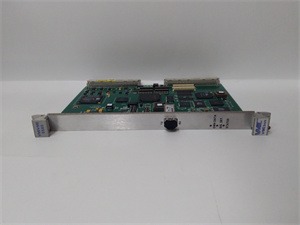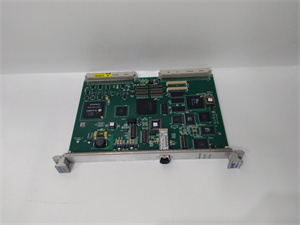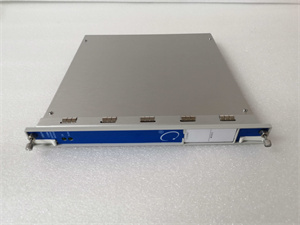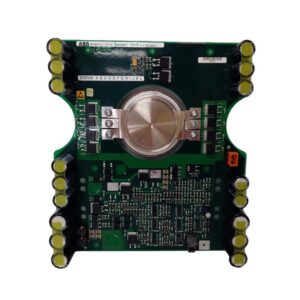Description
Product Description: GE VMIVME-5565
The GE VMIVME-5565 is a high-performance reflective memory node card designed for real-time data communication in industrial automation, control systems, and distributed computing environments. Engineered by GE Fanuc, this module integrates with VME64x bus systems to enable seamless data sharing across multiple nodes, including computers, PLCs, and embedded controllers. The VMIVME-5565 supports ultra-fast data transfer (up to 160 MB/s) with sub-microsecond latency, making it ideal for applications requiring deterministic communication. Its rugged design (operating temperature: -40°C to +85°C) and advanced error-checking (CRC) ensure reliability in harsh industrial settings.
Product Parameters
| Parameter | Specification |
|---|---|
| Bus Interface | VME64x (32/64-bit addressing) |
| Data Transfer Rate | Up to 160 MB/s (64-byte packets) |
| Latency | <1 microsecond |
| Memory Capacity | Up to 8 GB (configurable) |
| Nodes per Network | Up to 255 |
| Cable Length | Up to 500 meters (multimode fiber) |
| Error Checking | CRC (Cyclic Redundancy Check) |
| Operating Temperature | -40°C to +85°C |
| Protocol | Reflective Memory (RFM) |
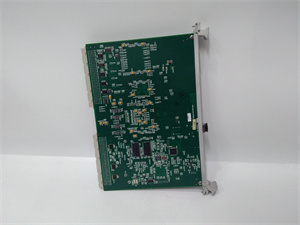
VMIVME-5565
Advantages and Features
- Ultra-Fast Data Sharing: Leverages reflective memory technology to broadcast data to all network nodes simultaneously, eliminating processor overhead.
- Wide Environmental Tolerance: Operates in extreme temperatures (-40°C to +85°C) and supports conformal coating for dusty/humid environments.
- High Reliability: MTBF > 200,000 hours (industrial-grade components) and CRC error detection ensure data integrity.
- Scalability: Supports up to 255 nodes and 8 GB shared memory, ideal for large-scale distributed systems.
- Low Latency: Sub-microsecond response time for real-time control and monitoring.
- Flexible Integration: Compatible with VME64x, PCI, and PMC form factors (via series variants like VMIPCI-5565).
Application Areas and Use Cases
Industries: Energy (power generation, oil/gas), manufacturing, aerospace, test/measurement, and transportation.
Scenarios: Real-time data acquisition, distributed control systems (DCS), radar/sonar systems, and high-speed simulation.
Scenarios: Real-time data acquisition, distributed control systems (DCS), radar/sonar systems, and high-speed simulation.
Case Study: A power plant in Texas integrated GE VMIVME-5565 modules into its grid monitoring system. The solution reduced data latency by 90% (vs. legacy systems), enabling instantaneous fault detection and reducing downtime by 35%. The module’s wide temperature range also eliminated the need for costly environmental enclosures.
Competitive Comparison
Compared to similar reflective memory solutions:
- Faster Throughput: 160 MB/s (vs. 100–120 MB/s for most competitors).
- Extended Temperature Range: Operates reliably in -40°C to +85°C (vs. standard 0°C to +60°C).
- Higher Node Density: Supports 255 nodes (vs. 128–200 nodes for alternatives).
- Lower Latency: <1 microsecond (vs. 1–2 microseconds for comparable products).
VMIVME-5565
Selection Recommendations
- System Compatibility: Ensure VME64x bus support (e.g., GE Series 90-70/30 systems).
- Environment: Choose the VMIVME-5565 for applications with extreme temperatures, vibration, or EMI exposure.
- Data Requirements: Opt for this module if needing >100 MB/s throughput or sub-microsecond latency (e.g., aerospace simulations, industrial robotics).
- Scalability: Ideal for projects requiring 50+ nodes or future expansion (8 GB memory upgradability).
Precautions
- Installation:
- Follow ESD protocols; use anti-static gear during handling.
- Ensure proper grounding and cooling (max 85°C ambient temperature).
- Network Configuration:
- Avoid exceeding cable length limits (500m multimode) to maintain signal integrity.
- Configure CRC error checking for critical data paths.
- Maintenance:
- Monitor LED status indicators for network errors.
- Update firmware annually (via GE’s Proficy software) for security/patch updates.
- Redundancy: Deploy dual-network configurations for fault tolerance (e.g., two VMIVME-5565 modules per node).

